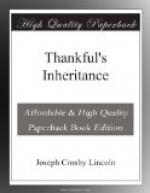Mr. Parker opened the hatch—the door of the carriage—and the captain assisted the passengers to alight. Emily caught a glimpse of the white front of a little house and of a tall, angular woman standing in the doorway holding a lamp. Then she and Mrs. Barnes were propelled by the strong arms of their pilot through that doorway and into a little sitting-room, bright and warm and cheery.
“There!” declared Captain Obed. “That cruise is over. Kenelm! Where is Kenelm? Oh, there you are! You tell that Winnie S. to trot along. We’ll settle for passage tomorrow mornin’. Now, ma’am,” turning to Thankful, “you and your relation want to make yourselves as comf’table as you can. This is Miss Parker, Kenelm’s sister. Hannah, this is Mrs. Barnes, Eben Barnes’ widow. You’ve heard me speak of him. And this is Miss Howes. I cal’late they’re hungry and I know they’re wet. Seems’s if dry clothes and supper might be the next items on the manifest.”
Miss Parker rose to the occasion. She flew about preparing the “items.” Thankful and Emily were shown to the spare room, hot water and towels were provided, the valise was brought in. When the ladies again made their appearance in the sitting-room, they were arrayed in dry, warm garments, partly their own and partly supplied from the wardrobe of their hostess. As to the fit of these latter, Mrs. Barnes expressed her opinion when she said:
“Don’t look at me, Emily. I feel like a barrel squeezed into an umbrella cover. This dress is long enough, land knows, but that’s about all you can say of it. However, I suppose we hadn’t ought to—to look a gift dress in the waistband.”
Supper was ready in the dining-room and thither they were piloted by Kenelm, whose hair, what there was of it, was elaborately “slicked down,” and whose celluloid collar had evidently received a scrubbing. In the dining-room they found Captain Bangs awaiting them. Miss Parker made her appearance bearing a steaming teapot. Hannah, now that they had an opportunity to inspect her, was seen to be as tall and sharp-featured as her brother was short and round. She was at least fifteen years older than he, but she moved much more briskly. Also she treated Kenelm as she might have treated a child, an only child who needed constant suppression.
“Please to be seated, everybody,” she said. “Cap’n Obed, you take your reg’lar place. Mrs. Barnes, if you’ll be so kind as to set here, and Miss Howes next to you. Kenelm, you set side of me. Set down, don’t stand there fidgetin’. What did you put on that necktie for? I told you to put on the red one.”
Kenelm fingered his tie. “I—I cal’late I must have forgot, Hannah,” he stammered. “I never noticed. This one’s all right, ain’t it?”
“All right! It’ll have to be. You can’t change it now. But, for goodness sakes, look out it stays on. The elastic’s all worn loose and it’s li’ble to drop into your tea or anywheres else. Now,” with a sudden change from a family to a “company” manner, “may I assist you to a piece of the cold ham, Miss Howes? I trust you are feelin’ quite restored to yourself again?”




